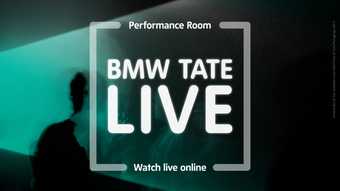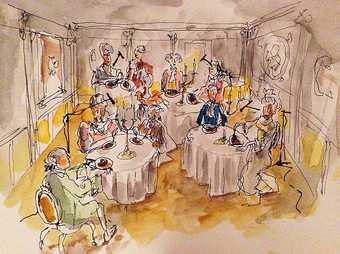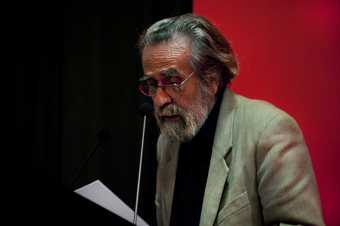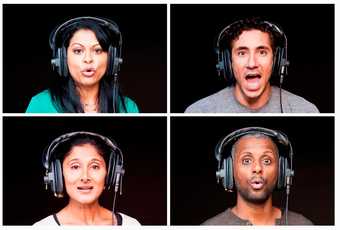
Actors inÌýNicoline van Harskamp's English Forecast performance, 19 September 2013Courtesy theÌýartist
How is English being used at present? How will this impact how we teach English, and what are the social and political implications of a language used by groups of people? These are just some of the questions prompted by Nicoline’s live online-only performance English Forecast.Ìý
English may not be the world’s most widely spoken language but it is the most commonly used cross-border tongue, mirrored by the fact the performance was watched live, from over 60 different countries -from Spain and Russia, to Japan andÌýMauritius.
In Nicoline’s live performance, four actors explore the artistic use, phonetics and musicality of the English language. Several of you who do not speak English as a first languageÌýrecorded your voiceÌýin English (earlier this summer at É«¿Ø´«Ã½), and these recordings where used as study material for this performance.ÌýYou were also invited to take partÌýon the night by repeating the actor’s words, recording or photographing yourself, and sharing on , Vine or usingÌý.ÌýDid you do this at home? If you missed it, watch again and tryÌýit.
This film file is broken and is being removed. Sorry for any inconvenience this causes.
BMW Tate Live: Performance Room - Nicoline van Harskamp
Here’s a few of your questions posed via Twitter, Facebook and Google+ in a live post-performance Q&A - hosted by curator Catherine Wood, who was joined by Nicoline,ÌýEnglish ForecastÌýactress Ariane Barnes and linguist Sonia MoranÌýPanero:
Charlotte Chorley, CambridgeWatching - it’s so interesting! Where will the English language goÌýnext?
Nicoline van HarskampThere’s very different ideas about that. In the preparation for this work I spoke with many different people with many different opinions about this, there are as many opinions as there as people. A lot of the ideas are to do with ‘wishful thinking’, I think I gave a few examples ofÌýthat.
Catherine WoodIn your research [Nicoline] you’ve been asking people to imagine [what the English language will be like in theÌýfuture].
Nicoline van HarskampTo imagine what English will be like in 50 years, then in 100 years on the basis of their own experience…But even so, the experts vary enormously in what they think willÌýhappen.
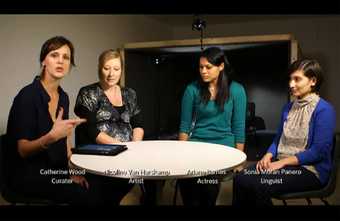
Live Q&A after the performance ofÌýEnglish ForecastÌýby Nicoline van Harskamp on 19 September 2013
Lisa Poole, LondonWhat are the actual accents of the actors? and do they specialise in doingÌýaccents?
Ariane BarnesI get asked that question a lot, whether my native tongue is French or English, and I refuse to asnawer with one because the reality is, is that I was raised pretty much with bilingual speakers fromMauritius, so I learned French and English at the same time. I hear a lot of actors say either ‘you can’ or ‘you can’t’ do accents, but I think really that it’s about how to break them down. Some people do it very naturally with their ears, their natural ear, and some just learn where to put the stresses. But I think it’s tying it back to the question I thought was very interesting… For me it comes back to ‘what is English, that will is always be here’, sorry, in the future tense…but what will it actuallyÌýbecome?
Nicoline van HarskampThat’s also why it’s important to work on the sound of English. All of this work is based on spoken word, not on written language. So this is really what happened between people, every sentence has been spoken by somebody else that you’veÌýheard.
Sonia Moran PaneroI think it’s important to point out that nowadays English is so basic, and it’s assumed that many people need to have it, it seems to be ‘not enough’. So this idea of becoming a lingua of learning more and more languages is not only an option, but sometimes a requirement for manyÌýjobs.
Anna Fergusson, London What aboutÌýEsperanto?
Nicoline van HarskampI looked a little bit into invented languages, there’s a whole range of invented languages in the world, Esperanto is one of them and probably the most successful one. There’s been so many attempts to invent a language. Typically, it’s quite impossible to invent a language because it has to grow and develop and is irregular and whenever you try to invent one, it just won’t work. Esperanto is far the most successful one ever, but I think English is catching up, bigÌýtime.
Sonia Moran PaneroI guess the idea behind Esperanto is that it’s supposedly a language doesn’t belong to anyone, any nation, and I guess that’s the idea to try to make it an international language. Really, we can also rethink English in these terms too…we can think about it without associating it only with the UK anymore. English is losing its territorial connotations and is becoming an option for all who useÌýit.
Get yourÌýÌýfor the nextÌýBMWÌýTate Live: Performance Room by artistÌýRagnar KjartanssonÌýon 24 October 2013 20.00 BSTÌýand followÌýÌýandÌýÌýforÌýupdates

